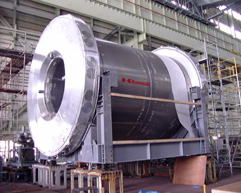Barrel Cryostat delivered to CERN
Jun. 11, 2001
Kawasaki recently delivered a barrelcryostat for the ATLAS Project to the European Laboratory for Particle Physics (Conseil Europeen pour le Recherche Nucleaire, or CERN) near Geneva, Switzerland. The cryostat, an aluminum-alloy vessel for cyrogenic storage, was ordered by the U.S. Department of Energy's Brookhaven National Laboratory, which is participating in the design and construction of the world's biggest particle accelerator.
ATLAS is an eight-year international project to build a detector for the Large Hadron Collider (LHC) underneath the CERN lab. When the LHC starts up in 2005, it will be able to collide speeding protons, or heavy atomic nuclei, head-on at 14 trillion eV. Scientists are attempting to reproduce conditions one one-trillionth of a second after the Big Bang and to find the Higgs particle-or "God particle"-which is expected to explain the origin of all mass.
Kawasaki's cryostat, a radiationresistant cylinder measuring 7 m long and 5.5 m in diameter, will contain a calorimeter to measure energies and positions of electrons and gamma rays. It will be installed at the center of the ATLAS superconductive toroidal magnetic detector.
Kawasaki has also delivered detectors to KEK (a Japanese government led particle accelerator study organization) and to SLAC (Stanford Linear Accelerator Center), among others. The company has been engaged in the development of accelerator systems in the form of free-electron laser (FEL) units since 1990. Kawasaki produced the world's first visible-light FEL oscillator in 1992, and the first infrared FEL oscillator in 2000.






